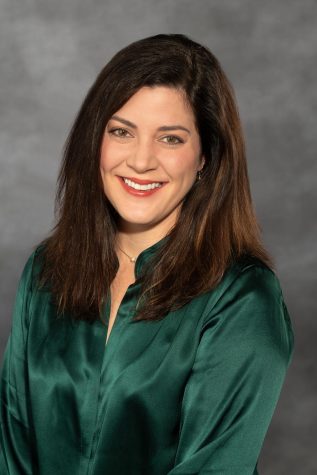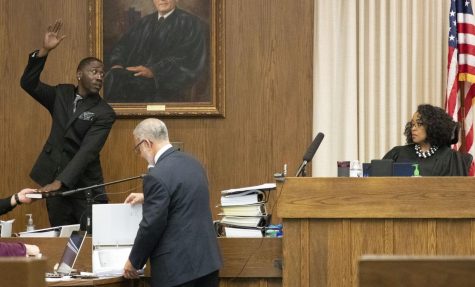Day Four
April 24, 2022
April 21 marked the fourth day of the exoneration hearings for the “Winston-Salem Five”.
This day centered largely around the defense’s claim that the confessions given to police by the defendants were false.
The Morning
To illustrate that point, the defense relied on the testimony of Dr. Hayley Cleary, a psychologist whose research centers around false confessions. Attorney Brad Bannon asked the questions for the defense.
According to Cleary, the confessions of the defendants were not consistent. However, as is standard for an expert witness, she did not assert that the confessions were false.
“There were extraordinary inconsistencies [between the confessions] and the physical evidence,” Cleary said.
Cleary was also shown clips of the defendants’ confessions and testified that the police officers’ tone and forcefulness may have caused the defendants to confess. However, the only parts of the interrogation that were recorded were the eventual confessions, as the officers did not record before then.
Cleary, who agreed with the assessment of day two and three witness Dr. Ginger Calloway that some of the defendants were intellectually disabled, testified that intellectual disability increases the likelihood of false confessions. She added that adolescence also increases this likelihood. This is because, according to Cleary, false confessions can come about when those being interrogated are more suggestible — that is, inclined to agree with authority — and research shows that adolescents and intellectually-disabled people are more likely to be suggestible.

Another reason why false confessions may come about, per Cleary, is if the person being interrogated feels they are in danger and can best get out of the situation by fabricating a confession. Cleary referred to the techniques interrogators use to create this sense of danger as “maximization techniques”. When asked about the fact that police threatened the young men with the death penalty during an interrogation, Cleary said that the threats likely increased the possibility of false confession.
“References to the death penalty are the most coercive maximization tactic there is,” Cleary said.
Cleary was also asked questions about perceptions of custody in youth and if innocent people are likely to give false confessions.
“Factually innocent people are more likely to get themselves into legal jeopardy,” Cleary said.
On cross-examination, the state asked Cleary if she had reviewed records of the defendants’ prior encounters with police. Cleary said she had not. On a follow-up question, the state asked Cleary if she reviewed instances where the defendants had, prior to November 2002, exercised their rights not to speak to police, which indicated they knew they could do so. Cleary said she had not. They also asked if the studies about false confessions being more prevalent in adolescents included youth in Cook County, who were tortured by police to elicit confessions in an extraordinary case.
Cleary said that within the world of psychology, the fact that police interrogations are guilt presumptive is “common knowledge”, with the true purpose being to gain a confession, not to gain additional information pertaining to the case.
The state also asked Cleary about the influence of setting or parental presence, to which she responded that both can have negative and positive impacts on false confessions.
“It depends on the child’s relationship with the parent,” Cleary said.
When asked if these five teenagers’ confessions were in fact false, Cleary said she would not be able to make that assessment and that it was the judge’s decision to make.
The Afternoon
After Cleary, the first of the four defendants took the stand. Jermal Tolliver was questioned by his attorney Mark Rabil, director of the Wake Forest School of Law Innocence and Justice clinic. Rabil was the defense attorney for Darryl Hunt, who served a 19-year-long prison sentence after being wrongfully convicted of murder and was exonerated in 2004.

To begin Tolliver’s testimony, Rabil asked his client if he had any involvement in the murder of Nathaniel Jones, knowledge of Jones before Nov. 15, 2002, or any information on who killed Jones. Tolliver denied all. Rabil then asked for Tolliver to give some background on his relationship with co-defendant Christopher Bryant.
Tolliver had been expelled from school earlier that month. Many of his days were spent across the street at Bryant’s house working on and riding bikes as well as smoking marijuana. Tolliver said he was friends with Rayshawn Banner, Nathaniel Cauthen and Dorrell Brayboy but hung out with Bryant more often, calling Bryant his best friend.
Nov. 19, 2002, was not Tolliver’s first run-in with law enforcement. Tolliver had to go to juvenile court “three or four” times before and the juvenile detention center twice, once for 24 hours and the second for three days. Most times when he was caught stealing from the nearby convenience store, the store owner would call the police, who would then talk to Tolliver’s mother. Tolliver would always go home and he expected it to be no different when he was taken downtown to the Public Safety Office on Nov. 19.
Rabil asked Tolliver to recall what he was doing Nov. 15, 2002, the day of Jones’s murder. As he would repeatedly say throughout his testimony, Tolliver could not recall many of the details of that day given that it was nearly 20 years ago, but he did remember generally the day’s events.
Tolliver was at the Bryant house watching a movie, and at one point they walked to the store. The two were planning on going to Hanes Mall, but it had started raining. Later that night, 16-year-old Jessicah Black picked the two up, as well as Cauthen and a person named Jed, to go bowling at Creekside Lanes.
First, they were going to stop at Black’s grandmother’s residence in Clemmons, but as they were driving by Moravia Street, they saw a crowd of people surrounding flashing lights. They parked the car and walked over to the scene, asked what had happened and learned that someone was killed. They returned to the car, went bowling and Tolliver returned back home “around 10 or 11 p.m”.
Four days later, detectives David Rose and Sean Flynn appeared at the Tolliver home. Arlene Tolliver, his mother, had called the police saying that her son had been acting strange since Jones’s murder and that he might know who did it. To Jermal it was unclear what they wanted to talk about, but they did not want to talk at the house.
Jermal was escorted to an unmarked police vehicle and taken downtown, where he was placed into an interrogation room alone for about 5-10 minutes. Jermal said it felt like a while, but also mentioned that a few hours prior, he had smoked “a nice one” with Bryant, which most likely affected his sense of awareness. When asked by Rabil about his alertness and abilities during the beginning of the interrogation, Tolliver responded “oh, I was high.” Jermal did not remember if his Miranda Rights were read to him.
Jermal said the detectives did not believe what he was saying about not being involved so after about an hour and a half, Jermal mentioned that he had thrown Jones’s wallet out the window of a bus near the McDonald’s on Hanes Mall Circle.
“I thought that’s what they wanted to hear because they didn’t believe I was telling the truth,” Jermal said.
At this point the police took Jermal to the area he claimed he threw the wallet. He sat in the back of the car eating fries and soda while police searched for nearly an hour. At no point was Jermal asked to point out any specific area. When the police returned to the car, Jermal noted that they were angry at him.
Jermal was taken back to the interrogation room where he was met by two different detectives. They said that Jermal’s friends told police that Jermal was involved with Jones’s murder. They also relayed a message from Arlene telling her son to tell the truth. Jermal was not in direct contact with either his friends or his mother. Police showed Jermal a statement of confession from Bryant and at this point, Jermal was contemplating confessing.
“I felt like no one would believe me anyway,” Jermal said. “I just wanted to go home.”
Jermal did not confess to the murder of Jones until Det. Flynn had threatened the fifteen-year-old with the death penalty — a punishment not allowed for juveniles in the state of North Carolina.
“I don’t want to die,” Jermal said. “I’d tell them whatever they wanted to hear.”
The police would record Jermal’s confession, a recording he would not hear until April 20, 2022. He says he sounded scared and tired as it was around 11 p.m.
Before cross-examination began, Jermal turned to the judge’s panel and said “No matter how this turns out, I want you to know that I am innocent.”
Assistant District Attorney James Dornfried asked questions for the prosecution. He asked Jermal about a statement from his brother Thayers Tolliver. When Thayers asked Jermal about Jones’s murder a few days after at their home, Thayers claimed that Jermal confessed. Jermal denied this interaction. Dornfried asked about another statement from one of Jermal’s sisters, Yolanda Tolliver, in which Yolanda claimed that she overheard Jermal speaking with Bryant and Cauthen about “robbing the old man’s house”.
“She said a whole bunch of stuff that wasn’t true,” Jermal said.
Dornfried then questioned Jermal about his use of marijuana, questioning if he truly was still high two-and-a-half hours later if he had been a regular user for the previous four years. Jermal insisted that he was still high when being interrogated.
Jermal did not testify in 2004 or 2005 because his counsel at the time, Clark Fischer, advised him not to. Dornfried questioned why Jermal would not take the stand if he truly believed he were innocent, and Jermal maintained that he was doing what his lawyer said to do.
Rabil believed that the state’s cross-examination of his client reinforced Cleary’s testimony from that morning.
“I tried to question him in sort of simple terms, one thing after another,” Rabil said. “Whereas the district attorney, it seems to me, is sort of proving what really happened here with the cops interrogating all these guys. They’re not graduate students, they’re not lawyers…they just try to trip them up.”
The state’s attorneys declined to comment.